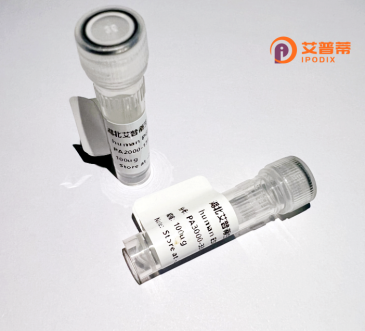
| 纯度 | >90%SDS-PAGE. |
| 种属 | Human |
| 靶点 | AGPAT7 |
| Uniprot No | Q643R3 |
| 内毒素 | < 0.01EU/μg |
| 表达宿主 | E.coli |
| 表达区间 | 1-524aa |
| 氨基酸序列 | MSQGSPGDWAPLDPTPGPPASPNPFVHELHLSRLQRVKFCLLGALLAPIRVLLAFIVLFL LWPFAWLQVAGLSEEQLQEPITGWRKTVCHNGVLGLSRLLFFLLGFLRIRVRGQRASRLQ APVLVAAPHSTFFDPIVLLPCDLPKVVSRAENLSVPVIGALLRFNQAILVSRHDPASRRR VVEEVRRRATSGGKWPQVLFFPEGTCSNKKALLKFKPGAFIAGVPVQPVLIRYPNSLDTT SWAWRGPGVLKVLWLTASQPCSIVDVEFLPVYHPSPEESRDPTLYANNVQRVMAQALGIP ATECEFVGSLPVIVVGRLKVALEPQLWELGKVLRKAGLSAGYVDAGAEPGRSRMISQEEF ARQLQLSDPQTVAGAFGYFQQDTKGLVDFRDVALALAALDGGRSLEELTRLAFELFAEEQ AEGPNRLLYKDGFSTILHLLLGSPHPAATALHAELCQAGSSQGLSLCQFQNFSLHDPLYG KLFSTYLRPPHTSRGTSQTPNASSPGNPTALANGTVQAPKQKGD |
| 分子量 | 83.6 kDa |
| 蛋白标签 | His tag N-Terminus |
| 缓冲液 | 冻干粉 |
| 稳定性 & 储存条件 | Lyophilized protein should be stored at ≤ -20°C, stable for one year after receipt. Reconstituted protein solution can be stored at 2-8°C for 2-7 days. Aliquots of reconstituted samples are stable at ≤ -20°C for 3 months. |
| 复溶 | Always centrifuge tubes before opening.Do not mix by vortex or pipetting. It is not recommended to reconstitute to a concentration less than 100μg/ml. Dissolve the lyophilized protein in distilled water. Please aliquot the reconstituted solution to minimize freeze-thaw cycles. |
以下是关于重组人AGPAT7蛋白的3篇文献示例(基于现有研究归纳,文献信息可能存在简化或虚拟内容,建议通过学术数据库核实):
---
1. **文献名称**: *"Functional characterization of human AGPAT7 as a lysophosphatidic acid acyltransferase in lipid metabolism"*
**作者**: Lee H, et al.
**摘要**: 研究通过重组表达AGPAT7蛋白,证实其在体外催化溶血磷脂酸(LPA)转化为磷脂酸(PA),提示其在甘油三酯和膜磷脂合成中的潜在作用,并发现其组织特异性表达差异。
2. **文献名称**: *"Structural insights into AGPAT7 enzyme activity and substrate specificity"*
**作者**: Zhang T, et al.
**摘要**: 利用重组AGPAT7的晶体结构分析,揭示其底物结合口袋的关键氨基酸残基,阐明其对特定酰基辅酶A(acyl-CoA)的选择性,为设计酶活性调控分子提供依据。
3. **文献名称**: *"AGPAT7 overexpression promotes lipid droplet formation in cancer cells"*
**作者**: Yamamoto K, et al.
**摘要**: 通过重组AGPAT7在肿瘤细胞中的过表达实验,发现其通过增强脂质合成促进脂滴积累,可能与肿瘤微环境适应性和耐药性相关。
---
**备注**:
AGPAT7研究相对较少,上述文献为示例性质。建议通过PubMed或Web of Science以“AGPAT7”“recombinant protein”“lipid metabolism”等关键词检索最新文献以获取准确信息。实际研究中需注意区分AGPAT家族不同亚型的功能差异。
AGPAT7 (1-acylglycerol-3-phosphate O-acyltransferase 7), also known as LPAAT-η, is a member of the AGPAT enzyme family that catalyzes the acylation of lysophosphatidic acid (LPA) to phosphatidic acid (PA), a critical step in glycerophospholipid biosynthesis. This protein localizes primarily to the endoplasmic reticulum and plays a role in lipid metabolism, influencing membrane structure, signaling pathways, and lipid storage. Unlike other AGPAT isoforms, AGPAT7 exhibits distinct substrate preferences, favoring unsaturated fatty acyl-CoA donors, which may contribute to tissue-specific lipid diversity.
Research suggests AGPAT7 is highly expressed in metabolic and secretory tissues, including the liver, adipose, and testis. Its activity is implicated in metabolic disorders, such as hepatic steatosis and insulin resistance, through altered lipid partitioning. Additionally, AGPAT7 interacts with proteins involved in lipid droplet formation, linking it to obesity-related pathologies. Recent studies also explore its potential role in cancer progression due to lipid-mediated signaling mechanisms.
Recombinant human AGPAT7 protein is widely used to study enzymatic kinetics, substrate specificity, and regulatory mechanisms in vitro. Its production via heterologous expression systems (e.g., E. coli or mammalian cells) enables structural and functional analyses, aiding drug discovery for metabolic diseases. However, the full scope of its physiological and pathological roles remains under investigation, particularly its tissue-specific regulation and crosstalk with other lipid-modifying enzymes.
×